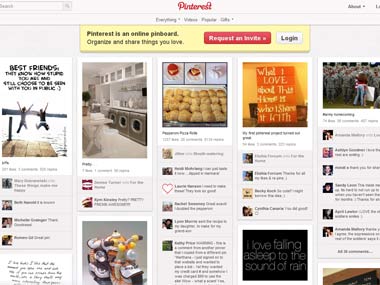Pinterest, the social media website which made sharing pretty pictures popular for everyone, recently found itself stumped when a user raised concerns over copyright issues. Now it seems the site has taken note of the copyright dilemmas and changed user policy and terms of service. The blog post by Kirsten Kowalski, which went viral, had raised serious doubts and questions over copyright violations on the site.
Federal copyright laws give the author of any copyrighted work (which includes photographs and copyright attaches automatically as soon as the work is created) the sole and exclusive right to publish and reproduce such work. So, basically, when you see a photograph that you love, you do not have any right to publish or reproduce that photograph unless you took the photo or got consent from the photographer to use the photo.
Pinterest users can create ‘pin’ boards where one can pin or share pictures that are interesting. As far as social media is concerned Pinterest has managed nearly 2o million users and is being dubbed as the next Facebook of sorts. The email which was sent earlier today states, [caption id=“attachment_254514” align=“alignleft” width=“380” caption=“Screengrab”]  [/caption]
When we first launched Pinterest, we used a standard set of Terms. We think that the updated Terms of Service, Acceptable Use Policy, and Privacy Policyare easier to understand and better reflect the direction our company is headed in the future.
It notes quite importantly that Our original Terms stated that by posting content to Pinterest you grant Pinterest the right for you to sell your content. Selling content was never our intention and we removed this from our updated Terms. The email also states, We released simpler tools for anyone to report alleged copyright or trademark infringements. These terms will go into effect for all users on 6 April, 2012. The new terms and policy prevent users from posting content which Pinterest deems could create a risk of harm, loss, physical or mental injury, emotional distress, etc. Content that is also off limits is anything that could potentially be labelled as child pornography, hateful abusive content, racially or ethnically offensive, defamatory, etc. Most importantly content that infringes any third party’s Intellectual Property Rights, privacy rights, publicity rights, or other personal or proprietary rights is now a strict no-no. But how exactly will Pinterest deal with major copyright violations is still unsure because according to Pinterest etiquette you can still credit a picture to the original source and get away with it. The problem arises, what if there is no way of determining the original source. Let’s hope Pinterest will be rise above these problems and find a way to ensure that copyright owners don’t start suing the site and its users.


)

)
)
)
)
)
)
)
)



